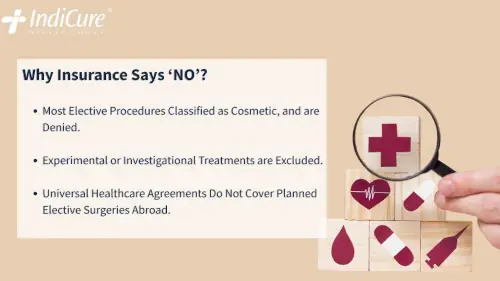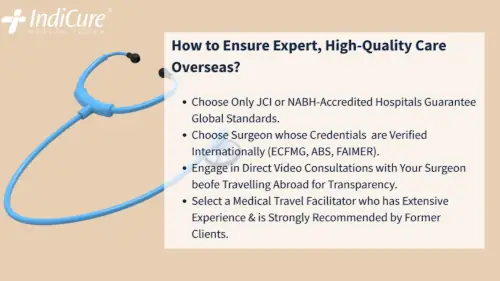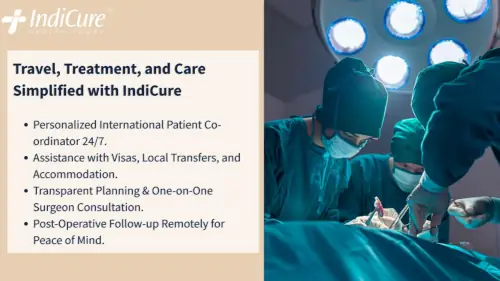Why Your Health Insurance Won't Cover That Procedure: A Comprehensive Guide to Affordable, High-Quality Elective Surgery Cost Abroad

The Crisis of Coverage: When Healthcare Says "No"
The pursuit of health and well-being should not be a battle, yet for millions of individuals across Western nations, particularly in the United States, Canada, Australia, and New Zealand, it often turns into a frustrating fight against bureaucratic red tape, crippling costs, or interminable waiting lists.
For patients seeking relief from chronic pain; improved function; or essential self-confidence through a necessary procedure, discovering that the critical procedure that you need is one of the procedures not covered by insurance can be devastating. This denial represents more than a financial hurdle; it is a breakdown of the promise of timely, high-quality healthcare.
The core dilemma facing patients today is two-fold. In the United States, individuals are often paralyzed by the astronomical costs associated with specialized treatments, a system where private insurers often pay double what public programs like Medicare pay for the same procedure, dramatically inflating the price tag. Conversely, patients in publicly funded systems, such as Canada, Australia, and New Zealand, frequently face chronic systemic delays and year-long waits for essential elective procedures, such as orthopedic or cataract surgeries, effectively denying them timely access to care. In both situations, the outcome is the same, with care being denied and the patient's quality of life suffering as a result.
However, a strategic and highly effective pathway exists for those trapped between financial ruin and physical suffering. Medical travel, once perhaps viewed with skepticism, has matured into a powerful, safe, and globally accepted solution. This market is not merely marginal; the total medical tourism market size was estimated at $31.09 billion in 2024 and is projected to skyrocket to $87.33 billion by 2030, reflecting a compounded annual growth rate (CAGR) exceeding 18%. This massive growth validates the decision to seek an affordable elective surgery cost abroad as a recognized, high-quality alternative to struggling with unresponsive domestic systems.
This guide will demystify the complex policy exclusions that lead to denial, demonstrate the profound financial and temporal advantages of seeking care internationally, and detail the rigorous quality assurances available to ensure patient safety. Ultimately, it demonstrates how securing a safe and successful medical journey for procedures not covered by insurance is best achieved through the meticulously orchestrated support of a trusted medical travel facilitator.
The Policy Wall: Why Western Insurance Denies Elective Care
Health insurance policies in Western countries are governed by strict internal criteria designed to limit financial liability, resulting in three primary reasons why patients face denial when seeking crucial treatments. Understanding these exclusions is the first step toward finding a viable alternative solution.
The "Medically Necessary" Hurdle and the Cosmetic Exclusion
The most common reason for claim denial revolves around the concept of "medical necessity". Insurers determine coverage based on whether the procedure is required to treat a specific health condition, alleviate pain, or restore bodily function lost due to injury, disease, or a congenital condition. If the procedure's primary purpose is deemed aesthetic enhancement or lifestyle improvement, it is classified as cosmetic and explicitly excluded from coverage.
This policy may look simple on the surface but often leads to serious and complex denials. For instance, a procedure such as breast augmentation, liposuction, or rhinoplasty is usually categorized as cosmetic. Yet procedures that drastically improve the patient's health and mobility, such as bariatric surgery for severe obesity or reconstructive plastic surgery following massive weight loss, often get tangled in this cosmetic definition.
Patients are forced to undergo exhaustive, prolonged documentation proving that non-surgical treatments have failed, or that the procedure is functionally necessary, before coverage might even be considered. If a procedure is deemed purely elective or optional, the insurer will deny coverage, leaving the patient responsible for the entire elective surgery cost if they choose to proceed privately.
The "Experimental or Investigational" Label
Another significant policy barrier is the denial of claims based on a procedure, drug, or medical device being classified as "experimental" or "investigational". This means the insurer claims there is insufficient clinical data to prove efficacy or safety, often regardless of whether the treatment is widely accepted by mainstream medical society or has received approval from bodies like the U.S. Food and Drug Administration (FDA).
This classification often affects patients seeking cutting-edge or highly specialized treatments, especially in fields like cancer care or complex reproductive medicine, such as certain advanced fertility treatments. Even when data suggests the procedure may be the best or only solution to a patient's medical problem, the internal policies of the insurance company often prevail, forcing patients to pay the full cost for these procedures not covered by insurance. The patient realizes they must circumvent this bureaucratic system entirely to secure the care they need.
The Myth of Reciprocal Agreements
For patients residing in countries with universal healthcare systems (Canada, Australia, New Zealand), reciprocal health agreements are often cited as a potential safety net when traveling abroad. Australia, for example, maintains agreements with 11 countries. However, these agreements offer only a conditional promise of emergency care.
For a U.S. citizen traveling to Australia or New Zealand, they may access emergency care, but routine medical services or planned elective procedures are definitively not covered. This means that for planned medical procedures, patients from these countries are functionally in the same position as uninsured U.S. citizens—they must be prepared to self-pay the full cost of their elective surgery abroad. Since policy terms already exclude foreign-sourced elective care, the patient loses nothing by traveling for the same procedure at a vastly lower price point.

The Market Drivers: Seeking Affordable Elective Surgery Cost Abroad
The main forces driving the medical tourism industry are not only policy denials but also the striking differences in cost and waiting time between Western countries and top international healthcare destinations.
The U.S. Cost Anomaly and Global Price Arbitrage
The United States operates within a unique healthcare economy where costs per surgery are significantly higher than in comparable industrialized countries, both within private and public insurance schemes. For example, the average cost for an inpatient Coronary Artery Bypass Graft (CABG) surgery in the U.S. traditional Medicare program was $44,149. This is nearly double the average cost of $24,847 reported among public insurance schemes in peer nations.
This price inflation is exacerbated by private insurers in the U.S., which often pay twice as much as traditional Medicare for the exact same procedure. This dramatic inflation of prices forces U.S. patients, particularly those seeking procedures not covered by insurance, to look globally for cost relief. In this context, medical tourism acts as a smart financial choice, allowing patients to get the same quality treatment at fair, market-based prices without the extra costs caused by complex systems or local hospital monopolies.
The Agony of the Wait List (Canada, Australia, New Zealand)
For patients in publicly funded systems, the value proposition is often centered on time rather than purely money. The long wait lists for essential elective surgeries, particularly in orthopedics, are frequently cited as the primary driver for Canadians seeking care abroad. In Canada, established benchmarks exist—182 days (about six months) is the recommended maximum wait time for hip and knee replacements. Yet, between 2020 and 2021, only about 62% of patients across Canada received joint replacements within this benchmark. Data from some practices shows that waiting times for surgery increased to the point where over 50% of patients waited longer than nine months for surgery, and some waited longer than 12 months.
Australians also face significant delays. Studies show that patients in Australia had a median wait of 84 days for cataract surgery, slightly longer than the median 66 days reported in Canada. For an individual suffering from chronic pain or deteriorating vision, a wait of six months to a year is intolerable, drastically impacting quality of life and physical function. Poor vision can increase the risk of falls and even other complications, which may lead to serious health issues.
Traveling for timely care abroad is thus viewed as a strategic, vital investment in immediate relief and recovery, framing the elective surgery cost abroad as the necessary price of prompt health intervention.
Specific Procedures Driving Global Demand
The international healthcare market has seen a surge in specific specialties that are either prohibitively expensive or severely restricted by domestic coverage:
- Orthopedic Surgery: With demand soaring due to aging populations, procedures like knee replacement and hip replacement are highly sought after. India, for example, is a prime destination offering costs that are up to 80% lower than the U.S. A total knee replacement in India can cost between $4,000 and $6,000, compared to the $30,000 to $50,000 or more in Western countries.
- Bariatric Surgery: Essential for managing debilitating obesity, these procedures -gastric bypass, sleeve gastrectomy are often difficult to get covered by insurance. The cost of gastric bypass surgery in the U.S. is around $35,000. In destination countries like India, this procedure costs around $5,500 to $6,000, representing substantial savings.
- Fertility Treatment (IVF): Many domestic plans, even international insurance plans, do not cover infertility investigations or treatment. Couples travel globally to access cost-effective IVF cycles. The average IVF cycle in the U.S. costs around $15,400, excluding medications; whereas in India, the average cost of IVF ranges from approximately $300to $4,610 for the cycle, making the decision to pursue fertility procedures not covered by insurance abroad a clear financial necessity.
- Cosmetic and Complex Dental Care: Dental implants are consistently a top medical tourism procedure. With costs for a dental implant ranging from $3,000 to $6,000 per implant in the U.S., traveling abroad for the same high-quality procedure can result in savings of up to 80%, with costs ranging from $1,000 to $2,500 per implant in countries like India and Mexico.
Safety First: Ensuring Healthcare Quality When You Travel
The biggest reservation patients have when considering procedures not covered by insurance internationally is the perception of risk or unknown standards of care. To address this, patients must rely on objective, third-party verification, which is the cornerstone of building trust and demonstrating expertise, authority, and trustworthiness in healthcare decisions.
The Critical Role of Accreditation: JCI and NABH
Safety is paramount, and the most reliable measure of an international hospital's quality is its accreditation status. The gold standard recognized globally is Joint Commission International (JCI). JCI is the international branch of the U.S.-based Joint Commission, offering an objective evaluation process designed to inspire and affirm the highest standards of healthcare quality and patient safety worldwide.
JCI accreditation is awarded only after a rigorous onsite survey confirms compliance with strict performance standards. These standards cover 11 key functional areas common to all healthcare organizations, including crucial aspects such as anesthesia and surgical care, patient/family rights and education, prevention and control of infections, medication management, quality improvement, and governance. JCI-accredited hospitals are required to maintain a culture of safety, function as a learning organization, and continuously monitor quality performance, aligning directly with global best practices.
For patients seeking care in India, IndiCure Health Tours exclusively partners with facilities accredited by JCI or the National Accreditation Board for Hospitals & Healthcare Providers (NABH), which is India's equivalent quality benchmark. By relying solely on these accredited institutions, IndiCure removes the burden of quality assessment from the international patients, guaranteeing that the environment, protocols, and technology meet the most rigorous global standards.
Vetting the Surgeon: Expertise, Training, and Verification
While JCI accreditation guarantees the facility's protocols, it does not regulate the individual doctor. Therefore, meticulous due diligence on the surgeon is essential. Patients must verify a surgeon's qualifications, including where they obtained their medical education and degree, their professional licensure, specialization certifications, and history of hospital employment.
A strong indicator of quality is a surgeon who has received training or certification in Western medical systems. International standards dictate that medical degrees should be verified against directories such as the FAIMER International Medical Educational Directory or the World Health Organization Directory. For international medical graduates who trained in the U.S., their certification status can be verified through the Educational Commission for Foreign Medical Graduates (ECFMG). ECFMG certification is recognized by JCI as a designated equivalent source for verifying a physician's graduation from a foreign medical school. For U.S.-trained surgeons, certification by bodies like the American Board of Surgery (ABS) demonstrates their commitment to high professional standards and lifelong learning.

IndiCure's selection process performs this meticulous background check, partnering with highly experienced, often internationally-trained surgeons who are leaders in their fields. To further build patient trust and transparency, IndiCure shares the surgeons' profiles with the patients, facilitates direct video consultations between the patient and the treating surgeon, allowing the patient to personally assess their expertise and ask detailed queries before committing to the elective surgery cost abroad.
Mitigating Risk: Specialized Insurance and Continuity of Care
While the financial savings on procedures not covered by insurance are compelling, a responsible patient must acknowledge the inherent risks of surgery and travel. Because standard health and travel insurance policies intentionally exclude complications resulting from planned procedures, specialized risk mitigation strategies are essential for a safe journey.
The Critical Need for Specialized Medical Travel Insurance
As established, the dual denial of no coverage for the surgery itself and no coverage for complications arising from the surgery is the greatest risk in medical tourism. Specialized insurance products designed specifically for medical tourists are critical to responsibly manage this risk.
A specialist single-trip travel insurance, such as those provided by firms specializing in medical travel, includes everything expected from standard travel insurance (lost baggage, travel delays, accidental illness) but crucially expands benefits to include medical complications resulting from the planned elective procedure. This coverage safeguards the patient's financial investment by assisting with unexpected costs associated with an unforeseen complication for up to 180 days after the procedure date.
Essential benefits of this specialized insurance include coverage for additional medical/surgical costs related to a complication, extended expenses for travel, meals, and accommodations due to delayed recovery, emergency medical evacuation/repatriation to the home country, and coverage for accompanying travel companions. Securing this policy is a non-negotiable step that legitimizes the decision to seek an affordable elective surgery cost abroad, transforming the high-savings scenario into a protected and financially sound health strategy.
Establishing a Continuum of Care
Post-operative care and complication management protocols in high-quality international hospitals adhere to stringent global standards. These facilities prioritize uniformity in medical practice, integrating continuous monitoring and diagnostic algorithms to promptly identify and address issues. High-quality hospitals follow international pain management guidelines and safety recommendations set by organizations like the World Health Organization (WHO) and the Centers for Disease Control and Prevention (CDC).
IndiCure's partner hospitals feature certified medical facilities, including state-of-the-art ICUs and dedicated 24-hour nursing teams focused on post-operative recovery. After any major operation, a reasonable amount of hospital stay is advised, with the option to extend based on the specific procedure, allowing for close monitoring.
Successful recovery is also influenced by patient-related factors, such as age, pre-existing medical conditions (like diabetes or cardiovascular disease), and nutritional status. The continuity of care ensures that these factors are managed pre, perioperatively and upon discharge. The commitment of a quality facilitator extends beyond the hospital stay; the IndiCure team coordinates remote post-operative consultations and feedback, ensuring that clear care instructions are transferred back to the patient's home country, guaranteeing long-term peace of mind.
Eliminating Complexity: IndiCure's End-to-End Support System
The complexity of self-arranging medical travel, from vetting quality and coordinating logistics to navigating cultural and language barriers, can be overwhelming.
IndiCure's comprehensive, end-to-end support model directly addresses these non-clinical friction points, positioning the organization as the indispensable partner for securing safe and affordable procedures not covered by insurance.
The Planning and Vetting Stage
The journey begins with transparency and expertise. IndiCure's core commitment is to partner only with the best JCI or NABH accredited hospitals and highly experienced, internationally-trained surgeons. This eliminates the patient's initial burden of due diligence on facility quality and surgeon credentials. Through facilitated video consultations, patients are given the power to ask their treating surgeon personalized queries one-on-one, fostering confidence and trust long before travel begins. This rigorous selection process is crucial for minimizing risks and guaranteeing high-quality outcomes.
Seamless Logistical Mastery
One of the most intimidating aspects of international medical travel is logistics, especially securing the necessary documentation. IndiCure simplifies this process dramatically by assisting with the medical visa application. Once treatment is confirmed, they provide an official visa invitation letter from the hospital and offer the complimentary service of filing the visa application, removing the stress of complex paperwork and bureaucratic procedures.
Beyond documentation, IndiCure manages the entire travel sequence. This includes arranging airport transfers, coordinating local travel, and ensuring that all logistical elements are seamless and stress-free. They even share a detailed itinerary before the patient's travel, so that they are well apprised of how things would move after their arrival in India. The goal is to allow the patient to focus entirely on their health and preparation for the procedure.
On-Site Comfort, Support, and Advocacy
Upon arrival, the patient is never alone. A dedicated International Patient Coordinator is assigned to serve as the single, bilingual point of contact throughout the medical journey. This coordinator is essential for tackling communication barriers, assisting with hospital visits, and generally acting as the patient's local advocate and resource, ensuring their needs are met 24/7.
Furthermore, accommodation arrangements are meticulously handled. IndiCure offers a range of options, from budget-friendly guesthouses to luxury serviced apartments, all conveniently located close to the partner hospital. All-inclusive treatment packages cover the hospital stay for the patient and one attendant, ensuring comfort and support during the critical recovery phase.
Post-Treatment Peace of Mind
IndiCure's commitment extends well beyond the discharge date. The patient coordinator ensures a safe discharge and manages the required monitoring period prior to departure. Crucially, the IndiCure team remains available for post-operative consultations and follow-up communication after the patient has returned home. This emphasis on long-term support guarantees continuity of care and ensures that the financial relief gained from the affordable elective surgery cost abroad is matched by sustained health benefits.

FAQs: Navigating Medical Travel for Procedures Not Covered by Insurance
-
Why do I need a specialist medical tourism facilitator like IndiCure instead of booking directly?
IndiCure provides essential quality assurance (vetting only JCI/NABH accredited hospitals), handles the complex logistics (visa support, airport transfers), and offers indispensable on-site support through a dedicated International Patient Coordinator. This comprehensive approach minimizes the risk and complexity that patients inevitably face when attempting to navigate a foreign healthcare system alone.
-
How can I be sure the quality of care is comparable to the U.S. or Canada?
Quality assurance is confirmed through mandatory international accreditation. IndiCure partners exclusively with hospitals holding Joint Commission International (JCI) or NABH accreditation. These bodies enforce globally recognized standards for facility management, infection control, surgical safety, and overall governance, ensuring the highest level of care.
-
What happens if a medical complication arises after my elective surgery abroad?
Standard domestic health insurance and conventional travel insurance explicitly exclude coverage for complications arising from planned elective procedures. To protect your investment, we strongly advise securing specialized medical travel insurance. This coverage is designed to assist with additional medical costs, extended accommodations, and emergency medical transport or repatriation related to the planned procedure.
-
Are the surgeons truly board-certified and experienced? How does IndiCure verify this?
Yes. IndiCure rigorously vets surgeon credentials, focusing on international training (e.g., ECFMG certification, recognized by JCI) and board specialization, ensuring they meet Western standards of expertise. We facilitate pre-travel video consultations so you can personally assess the surgeon's qualifications and discuss your case directly.
-
How much money can I realistically save on procedures not covered by insurance, like bariatric or orthopedic surgery?
Savings are typically substantial, often ranging from 50% to 90% compared to equivalent Western costs. For instance, a total knee replacement, which can cost $35,000 or more in the U.S., is available for $4,000 to $6,000 in destinations like India, representing savings of up to 80%.
-
Does my regular health insurance or travel insurance cover me if I travel for an elective procedure?
No. Domestic insurance policies, including U.S. private plans and reciprocal health agreements in countries like Canada, Australia, and New Zealand, explicitly exclude coverage for planned elective surgeries sought overseas. Coverage is generally restricted only to urgent, life-threatening emergencies.
-
How are communication barriers handled during the treatment and recovery phase?
IndiCure ensures seamless communication by assigning a dedicated, bilingual International Patient Coordinator. This person serves as your single point of contact, providing language assistance, coordinating hospital visits, and navigating local customs throughout your stay.
-
What steps does IndiCure take to ensure I have all necessary travel and visa paperwork?
IndiCure manages all the logistical complexities of travel documentation. IndiCure provides the official hospital invitation letter required for a medical visa and offers the complimentary service of filing the medical visa application on your behalf, minimizing your administrative effort and ensuring compliance.
-
What is typically included in the all-inclusive treatment packages?
Packages are designed for transparency and simplicity. They typically cover the surgeon’s fee, hospital charges, operating theater costs, necessary medications consumed during the hospital stay, and accommodations for the patient and one attendant while in the hospital. IndiCure believes in maintaining complete transparency and clearly mentions all inclusions and exclusions in the package.
-
What is the typical recovery period abroad I should plan for before returning home?
The duration depends heavily on the procedure. While a minimum 24-hour hospital stay is required after any major operation for close monitoring, patients must budget for an extended stay in local accommodation—usually one to two weeks—as mandated by surgeons to ensure stability and reduce the risk of complications before undertaking long-haul international travel.
References:
https://www.smartraveller.gov.au/before-you-go/health/reciprocal-health
https://pmc.ncbi.nlm.nih.gov/articles/PMC9465897/
https://pmc.ncbi.nlm.nih.gov/articles/PMC3211901/
https://www.moneyhub.co.nz/going-to-australia-for-medical-treatment.html
https://www.grandviewresearch.com/industry-analysis/medical-tourism-market
https://www.precedenceresearch.com/medical-tourism-market